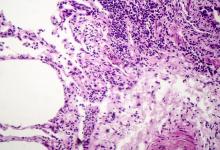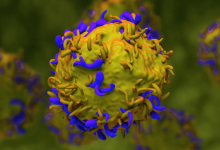Interleukin Targeted Biologics Increase Risks of Infection Save

A systematic review of the literature shows that, compared to placebo, the use of non-TNF, interleukin inhibitor biologics may be associated with significantly higher rates of serious infections, opportunistic infections, and cancer.
The authors performed a fixed-effects meta-analysis to assess the influence of non-TNF, interleukin inhibitor biologics on reported rates of serious infections, opportunistic infections, and/or cancers. IL Inhibitors (and their cytokine target) included were: anakinra (IL-1), rilonacept (IL-1), canakinumab (IL-1), tocilizumab (IL-6), olokizumab (IL-6), clazakizumab (IL-6), sirukumab (IL-6), sarilumab (IL-6), ustekinumab (IL-12/23), brodalumab (IL-17), secukinumab (IL-17), ixekizumab (IL-17), and guselkumab (IL-23).
The study included 74 studies and 29,214 patients (24 236 patients for serious infections, 9998 for opportunistic infections, and 21 065 for cancer patients).
IL inhibitor treated patients had a higher risk of:
- Serious infections (OR, 1.97; 95% CI, 1.58-2.44; P < .001)
- Opportunistic infections (OR, 2.35; 95% CI, 1.09-5.05; P = .03)
- Cancer (OR, 1.52; 95% CI, 1.05-2.19; P = .03)
Analysis of individual drugs shows that not all interleukin inhibitors were associated with significantly higher rates.
This is one of the few studies to show ab increased risk of opportunistic infections with IL inhibitor therapy.
The authors note that this study has limitations. These results must be interpreted with caution because of factors intrinsic to the analysis of study-level data. This analysis assumes that the risk of infections or cancer is constant throughout the duration of treatment. Previous data have suggested that the risk for infection with TNF inhibitors is highest within the first 90 days of therapy, but to our knowledge, no data are currently available concerning use of IL inhibitors.










If you are a health practitioner, you may Login/Register to comment.
Due to the nature of these comment forums, only health practitioners are allowed to comment at this time.